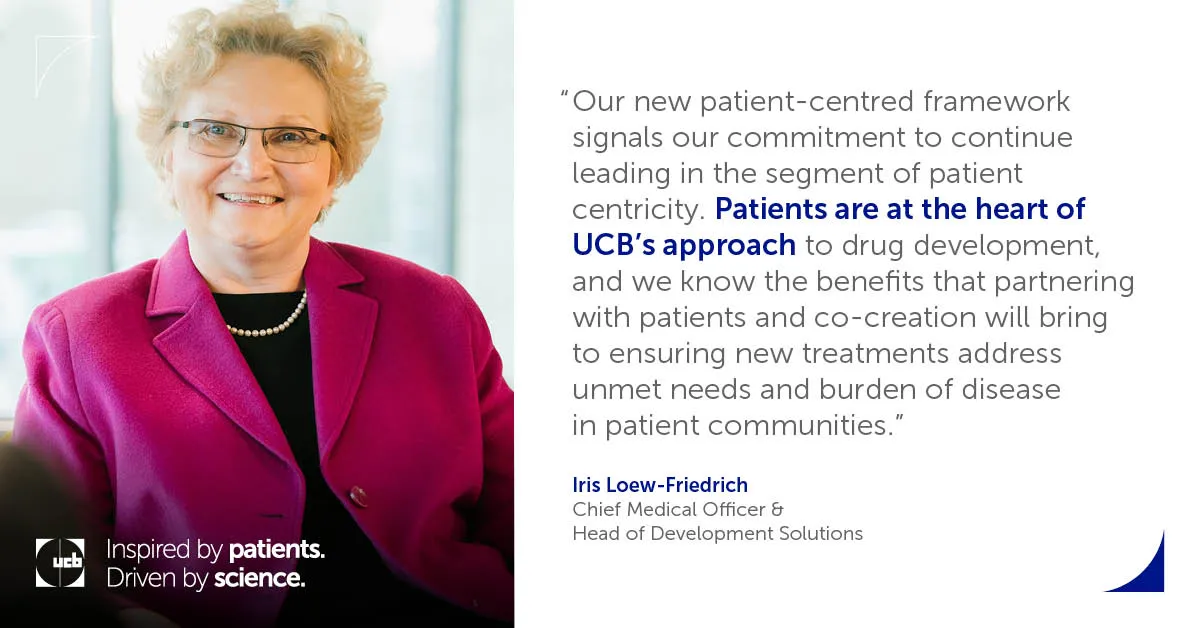New patient-centred framework informs UCB’s approach to R&D drug development and ensures patients are at the heart of creating our innovative solutions
As part of its commitment to create innovative solutions and transform the lives of people living with severe diseases, UCB has developed and implemented a new framework centred around its most important stakeholder – the patient. UCB’s new robust end-to-end framework, designed to ensure that patients and key stakeholders provide direct input as early as possible into the overall strategy behind research and development programs, as well as the entire drug lifecycle, will play a vital role in achieving successful outcomes for patient communities in the future.
Over the last decade, patients have been increasingly active and empowered when it comes to decisions concerning their health. Traditionally patients were viewed by pharmaceutical companies as simply customers, nowadays they are considered true partners working towards a collective goal. As a result of this patient role progression, the pharmaceutical industry has embraced the notion of patient centricity, which places importance on patients as ‘co-creators’ in the R&D process.
Patient engagement is no longer simply about validating assumptions or having patients participate in research; instead, it has become far more valuable to co-create solutions that tackle the diverse challenges that matter most to them as individuals and their caregivers.

Critical to UCB’s patient-centred framework is inclusion of the patient voice early in the R&D process, ensuring their needs are understood and embedded early in the research to help inform decisions. It is a vital part of gaining a holistic and 360-degree data-enabled view of the patient and involves working together to answer critical questions along the lifecycle of drug development.
This adds tremendous value by ensuring that patient perspectives form the basis of future operations and outcomes. In tandem, it provides an opportunity for patients to offer insights into unmet areas of need, on outcomes that matter most to them and potential areas of concern regarding study designs.
As an example, UCB recently constructed the formulation, refinement and first evaluations of a new evidence-based approach to measure fatigue in Systemic Lupus Erythematosus (SLE), called FATIGUE- PRO (Patient Reported Outcomes) – developed in tandem with patients who described their direct and explicit experiences of living with the condition.
UCB understood patients’ concerns that many instruments currently used to measure fatigue come with limitations such as not addressing the breadth of fatigue experienced by those living with the condition. The research team collected qualitative data throughout the process, refining the parameters, including physical fatigue, cognitive fatigue and susceptibility to fatigue, based on patient evidence. The final outcome was a new PRO instrument to measure fatigue that addresses the conceptional limitations of current tools, and that will have a significant impact on the lives of SLE patients.
The new patient-centred framework supports UCB’s scientists as they look to advance their understanding of human and disease biology. Listening and learning from patients at the earliest stages of research support a deeper appreciation of patients’ reality and unmet needs, allowing them to turn science into meaningful solutions that will transform the way diseases are treated.
In another recent instance of patient co-creation, UCB engaged with a Think Tank to ensure the patient voice was accurately reflected in their benefit risk assessments. By receiving this insight first-hand in a collaborative environment, UCB can better determine the risks and benefits of a treatment, leading to improved outcomes for patients down the line.
It’s clear that patients are at the heart of everything UCB does, and along with the pharmaceutical industry, as a whole, is embracing the role of patients as agents in their own healthcare journey. By partnering with patients in a specially designed patient-centric framework, and thus providing patients a more meaningful experience and role as co-creators, more impactful patient outcomes are on the horizon.


Leave a Comment